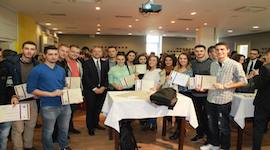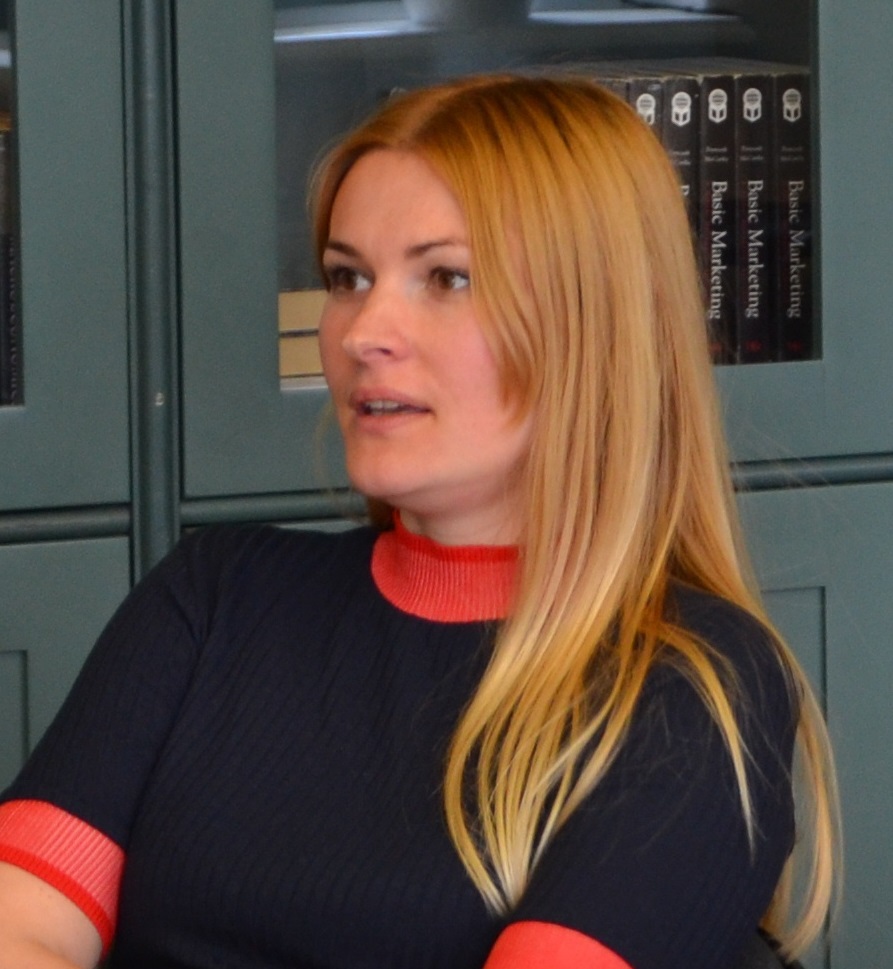Part of the mission of WDI’s Education Initiative is to identify and share new ways to enhance management education in emerging markets. This can be achieved through the adoption of new business models, or the introduction of new programs or technologies, or a combination.

To assist in this mission, the Education Initiative will soon deploy three student teams comprised of Weekend MBA students from the University of Michigan’s Ross School of Business as part of the school’s Multidisciplinary Action Projects (MAP) program. MAP is an immersive learning course offered at Ross during which students tackle a real-world strategic project under the guidance of faculty advisors.
Two MAP teams will work on entrepreneurship projects in Kosovo and Morocco, and one team will examine e-learning at a major technical university in Georgia.
“The MAP project teams will work with local university faculty, administrators, and business people in the three countries,” said Amy Gillett, vice president of WDI’s Education Initiative. “After gaining an appreciation for the local context and challenges, the teams will make recommendations for how to move forward in leveraging global best practices, adapting them to local realities, and coming up with effective solutions.
“WDI will then share their findings, stimulating a fruitful exchange of ideas across the emerging markets. We hope this will ultimately lead to more effective delivery of management education.”
The MAP project focused on e-learning will travel to Georgian Technical University (GTU) in Tbilisi. At GTU, e-learning is mainly blended with traditional, lecture-style learning, and is considered a supplement to strengthen and enrich learning results. Most students there are well versed in technology and would like to see more e-learning components in their course offerings. However, GTU lacks an overall strategy on how to pay for and implement e-learning across the campus.
The MAP team will research current global best practices in e-learning, examine existing e-learning programs at GTU, and look at its technology infrastructure – among other things – to develop an overall strategy.
“We think that e-learning could improve education at GTU by making the formal educational process more flexible and learner-oriented, and reach a wider target group,” said Tamar Lominadze, professor of informatics and control systems at GTU.
Lominadze recently came to the University of Michigan as a visiting scholar at the Weiser Center for Europe & Eurasia. While there, she met WDI’s Gillett and discussed a previous MAP project with the Stockholm School of Economics in Riga, Latvia.
“I asked Amy about the possibility of developing a similar project for GTU in the field of e-learning,” Lominadze said.
With the upcoming MAP project, “we hope to obtain a more clear, strategic vision for the further long-term sustainable development of e-learning at GTU,” she said. “We have several problems to research. We hope that as a result of this project we will be able develop and implement the e-earning process at GTU in the most timely and cost-efficient way.”
The first of two entrepreneurship projects is with the Business Support Centre Kosovo (BSCK), located in the capital of Pristina. BSCK has leveraged many different support tools to promote new venture creation by young entrepreneurs, including entrepreneurship training, funding (grant or bank loans with subsidized interest rates), and no-cost consultancy.
The Ross MAP team will assess and evaluate BSCK’s efforts to date to develop local entrepreneurs and promote job creation, identify which of its initiatives have been most successful in developing entrepreneurs and potentially could be replicated in other post-conflict countries, and find possible gaps in activities and make recommendations on a strategy to further stimulate entrepreneurship in Kosovo.
BSCK Director Besnik Krasniqi visited Ross while he was a visiting scholar on a fellowship through the University of Michigan’s Weiser Center for Europe & Eurasia. Krasniqi heard about MAP projects from Ross professors and MBA students, and came way impressed.
“I thought it is very important for Kosovo and BSCK to use this opportunity for cooperation,” he said.
He said having the MAP team evaluate the current tools used by BSCK to promote entrepreneurship “will help BSCK adopt a strategy for building a sustainable model for entrepreneurship development.”
The second entrepreneurship MAP project is at Al Akhawayn University in Ifrane, Morocco.
Growing the entrepreneurial mindset is vital to economic growth and employment in countries around the world, including Morocco. Youth unemployment is 18.5 percent, and entrepreneurship provides a feasible solution to joblessness.
As one of the leading public universities in Morocco, Al Akhawayn promotes and develops the entrepreneurial spirit among its community members including students, faculty, and staff. This includes a required entrepreneurship course for all undergraduate business students, organizing and hosting of entrepreneurship competitions, and four centers at the university – the executive education center, the conference center, the Hillary Rodham Clinton Center for Women’s Empowerment, and the Center for Business Ethics.
The MAP team is tasked with providing Al Akhawayn with a roadmap for implementing an enabling entrepreneurship ecosystem leveraging the university’s assets and centers. This roadmap will be crafted in such a way that it can be duplicated at other universities in Morocco.
Call it happenstance. Maybe even serendipity.
But Perry Samson has another way to describe it. “It was a gift,” he said.

How else to explain the chance meeting between Samson, a professor at U-M, and Amy Gillett, vice president of WDI’s Education Initiative, at a January 2015 Ross School of Business summit on the future of education.
Samson had developed a new active learning platform for classrooms called LectureTools and wanted to explore if his new application would be useful in other countries. Among its features, LectureTools captures video of lectures, allows students to ask questions using their laptop during a professor’s presentation, and lets instructors pose questions in real time to gauge if students understand the material.
WDI and Gillett had longtime partner school – the Stockholm School of Economics in Riga, Latvia (SSE Riga) – whose leadership was receptive to new technology and innovation. And Gillett could deploy an MBA team from Ross to see if Samson’s tool would be a fit in Riga and other markets.
“I thought his tool could improve the quality and reach of management education there,” Gillett said of SSE Riga. “I immediately proposed the student team. They would be able to find out if this was appropriate technology for the school, if the faculty and students saw the value, and if so, what the benefits were and how LectureTools could best be adapted for the Latvian market, and by extension, other emerging markets.”
Samson, the Arthur Thurnau Professor in the Department of Atmospheric, Oceanic, and Space Sciences, as well as founder of LectureTools, loved the suggestion.
“The timing was excellent,” he said. “As a small company, we always try to identify better ways to do our work.”
In June 2015, four Evening MBA students from Ross traveled to Riga as part of the school’s Multidisciplinary Action Projects (MAP) program. MAP is an action-based learning course offered at Ross during which students tackle a real-world strategic project under the guidance of faculty advisors.
The students were tasked with conducting an assessment of the Latvian market for Echo 360, the active learning technology company that bought Samson’s LectureTools. They also developed a market entry strategy for Echo360’s growth into Latvia and other emerging markets.
The student team interviewed faculty, administrative staff, and students at SSE Riga. They conducted secondary research on the higher education technology field to better understand how technology is adopted at universities. They also looked at demographic trends within the Latvian higher education system.
“It was far beyond what Echo 360 could do,” Samson said.
He said the students were “remarkable, enthusiastic. They thought of a number of things I didn’t think of.
“They provided good insight on what drives adoption of technology in education and identified a number of suggested process changes,” Samson said.
Gillett said WDI’s Education Initiative works to improve the delivery of management education in emerging markets through a variety of ways. One way is to pair MAP teams with WDI partner on any number of projects.
“This is a great way for us to help our partners explore innovative ways to deliver management education for the 21st Century,” Gillett said. “WDI’s Education Initiative will take the learnings from this project and others like it and serve as a hub for how to make management education more efficient, effective, and accessible in the future.”
Gillett says the project was well received by the Ross students. “The students on the MAP team loved working on the project. There was a big demand to be part of the project.”
Allie Schachter was one of the student team members and said she enjoyed applying what she had learned in the classroom to a real-world business problem. (Watch a video of Schachter talking about the MAP project here.)
“My MAP experience solidified and contextualized many of the concepts discussed in class, which was an incomparable educational experience,” she said. “It was a great opportunity to work with a group on a very large and involved project. Throughout the course of our project, we honed our ability to work together, delegated tasks to one another, and navigated difficult conversations and challenges together.
“It was a really great opportunity to gain experience working for and with others. I will certainly carry those experiences forward when working with teams at work and in future classes.”
Samson said he too learned a lot and is grateful to Gillett and the student team.
“It was a wonderful interaction,” he said. “It was invigorating for me to sit down and have conversation with someone who is thinking more deeply about all these things.”
Aija Priede-Sietina is not the kind of businesswoman who fits into easy categories. The Latvian architect and mother of two is co-founder and general director of KUKUU, a small, family-owned company that crafts stylish baby furniture. Well schooled in designing and building things, Priede-Sietina, however, lacked formal business training.

“I had to learn this step-by-step,” she said. Running a company “was a big challenge…[but] you can never find out what you can do if you don’t really try.”
KUKUU was birthed from this can-do, adaptive spirit. As Aija and her designer husband Daneks Sietins raised their daughters, the couple saw a market for what she called “functionally designed, ecological, sustainable and matching furniture that is safe for children, and…actually nurtures a child’s personality.”
They launched KUKUU in 2011 and soon its bird&berry collection earned a Latvian Design Society Design Award, an A’Design Award (First Prize for the Best Manufactured Product), and international attention.
As a result of its newfound success, KUKUU faced the challenge of increased demand.
“I always had doubts about how large of stock to keep,” Aija said.
This led her to apply to the Supply Chain and Logistics Management program offered by WDI in partnership with the Stockholm School of Economics in Riga (SSE Riga). Aija attended free of charge as a WDI Teeter Scholar, named in memory of Robert M. Teeter, an advisor to U.S. presidents from 1968-1992 and a WDI board member. Through the scholarship program, WDI awards 20 full-tuition scholarships annually to managers from small & medium-sized enterprises and NGOs in emerging markets to attend WDI Professional Education programs.
During the supply chain program, which took place at SSE Riga in late April, Aija and six other participants learned to see their organizations’ operations in a new way. They gained new tools for ensuring their organizations are lean, efficient, and ready to compete in today’s increasingly complex and globalized economy.
Aija gave high marks to the program’s practical casework and intimate size.
“We all had the opportunity to ask questions and to work with our business models and to have some opinions from other participants,” she said. “Now I have some formulas to use and am testing how it works.”
Course instructor Damian Beil, a WDI faculty affiliate, said that the program has plenty to offer even small companies like KUKUU.
“All businesses with a supply chain must manage inventory, capacity, and customer responsiveness to weather against uncertainty,” said Beil, who also is an associate professor at U-M’s Ross School of Business. “These challenges are fundamentally the same whether the business is small or large. Participants in the program get a lot of value from seeing this, and from hearing about others’ experiences at different firms.
“For a small firm, this can lead to great ideas about how to better work with large suppliers and customers.”
Aija said managers from companies big and small could benefit from the program. The skill sets offered in these training programs help companies like KUKUU face new challenges and reach new heights. KUKUU is now sold in 16 countries.
Aija said her experience as a start-up company “encourages people to do something, because we didn’t have this background in producing our products and selling around the world.”
“We took the risks,” she said. “We are moving forward. We see potential, and that keeps us going.”
Since 1992, WDI Executive Education has trained more than 15,000 managers from over 8,000 organizations in Central & Eastern Europe, Southeastern Europe, Russia, Latin America, Morocco, Rwanda, China and Vietnam. WDI’s partner institution SSE Riga is the top business school in Latvia and contributes to the economic and social development of the Baltic region.
Social media marketing refers to marketing activities conducted in social communities online including social networks, social publishing, gaming, and social commerce. In this two-day program, you will learn how to use social media as a valuable component of marketing strategies. You will apply the process of strategic planning to integrate social media into your existing marketing plans. You will learn the latest innovations in social media and discover how to assess the effectiveness of social media tactics. If you are ready to your organization’s presence online, using digital media and marketing strategies, please join us for this cutting-edge program!
Sales leaders and their sales organizations are facing unprecedented levels of pressure and complexity both externally and internally to deliver high levels of performance. Externally, increasingly global marketplaces — often disrupted by new technologies — have resulted in ever-higher customer demands. Internally, sales organizations require tighter functional alignment, faster strategy execution and more effective sales processes. This program addresses the creation of a high-performing organization at the strategic level, framed in the context of rapid change and higher levels of customer demands. Starting with design of a meaningful strategy, this program tackles the challenge of seamless execution. It then explores the intraorganizational aspects of defining appropriate sales structures and key aspects of sales force management such as recruitment, development and retention of sales talent. View brochure at: https://wdi.umich.edu/ee/activities/open/Sales_Leadership.pdf